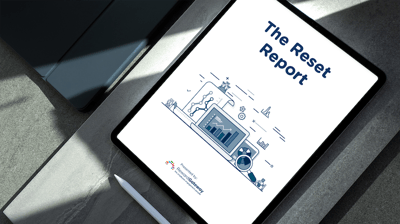Fuelling business growth through a focussed employee experience
As 2022 draws closer, HR leaders everywhere are still reflecting on how the COVID-19 pandemic disrupted the landscape of HR, ushering in a much-needed evolution, a new mindset on flexibility and a heightened focus on employee communication and recognition.
With this change, it's important to reset, realign and ask: where does employer and employee sentiment stand?
 A recent study conducted by Reward Gateway surveyed 3,809 employees and senior HR decision-makers across the UK, U.S. and Australia, revealing more about the expectations and intentions of HR leaders and their employees in this unique time, highlighting employees’ plans to leave their current jobs and what HR leaders are willing to do to keep them.
A recent study conducted by Reward Gateway surveyed 3,809 employees and senior HR decision-makers across the UK, U.S. and Australia, revealing more about the expectations and intentions of HR leaders and their employees in this unique time, highlighting employees’ plans to leave their current jobs and what HR leaders are willing to do to keep them.
The data suggests that the next 12 months will define how employers can balance healthy employee churn while attracting, retaining and engaging top talent.
Overall, the research reveals key themes to a positive employee experience:
| Reward and recognition |
| Trust in leadership |
| Positive managerial relationships |
| Fair pay |
| Company culture |
| Open and honest working environments |
HR leaders, on the flip side, are aware they’ll be required to adapt to employees' newly revealed needs, redefining what they offer as a company to attract and retain the best talent in the wake of COVID-19. Many plan to increase the amount they invest in key areas such as employee benefits, reward and recognition, employee feedback, employee communications and wellbeing.
 The war for talent is acute now, with the National Skills Commission reporting the number of job advertisements around Australia has reached a 12-year high and doubled in number between March 2020 and March 2021.
The war for talent is acute now, with the National Skills Commission reporting the number of job advertisements around Australia has reached a 12-year high and doubled in number between March 2020 and March 2021.
Industry-wide, construction and public sectors saw the biggest increases in job ad growth, while the technology, construction, hospitality, healthcare and medical sectors remain in talent deficit.
A recent analysis by RMIT Online revealed the country needs an additional 156,000 more technology workers by 2025.
The data and trends are clear: The upcoming year will be a time for HR leaders and employees alike to reset, reconsider their goals and priorities, and realign. Every company has been forced to change, and many are in the process of reinventing themselves once again.
Attracting and retaining employees through 'healthy churn'
The pandemic put many organisations in a uniquely challenging position. Many felt uncomfortable letting go of workers because of the world’s negative state, while others were forced to reduce their staff to keep the business afloat.
Now, they are trying to play catch-up. Many HR leaders surveyed noted they are currently hiring, while many employees shared they are currently looking for a new job or will be this year, and would consider different opportunities than before the pandemic, given the opportunity to work remotely.
 Globally, nearly every HR manager surveyed (98%) agreed that there are benefits to a healthy amount of employee churn, including 'the ability to bring in new talent' (52%) and 'an opportunity to enhance Diversity, Equity and Inclusion (DE&I) in [their] organisation' (46%).
Globally, nearly every HR manager surveyed (98%) agreed that there are benefits to a healthy amount of employee churn, including 'the ability to bring in new talent' (52%) and 'an opportunity to enhance Diversity, Equity and Inclusion (DE&I) in [their] organisation' (46%).
But regular, ongoing turnover is not sustainable, nor healthy for an organisation looking to succeed, as it undermines teamwork, creating a culture of instability and a need to frequently re-train workers, while compromising intellectual property. The data suggests that the next 12 months will define how employers can balance healthy employee churn while attracting, retaining and engaging top talent. Our survey shows:
- 73% of Australian HR leaders have held back on firing because of COVID-19
- 80% of Australian HR leaders report their companies are currently hiring
- 56% of Australian employees note they would now consider careers they might not have before because location is not required
- 42% of Australian employees surveyed report they are either currently looking for a new employer, or will be this year
- 54% of Australian employees surveyed note that they are not looking for a new job currently because they are happy, but would leave if a better opportunity presented itself
There are several different factors that are driving new hiring, and the widespread commonalities among several different industries further highlight the need for talent. Our survey showed that the top reasons Australian companies are looking to hire include:
| Filling new positions due to company growth – 70% |
| Replace jobs lost during the pandemic – 56% |
| To obtain new skills needed for the new world of work – 72% |
To attract and retain top talent in a highly competitive, unprecedented market, companies must reinvent their toolkits and maximise on strategies that will make them stand out as an employer of choice.
In our first-ever Reset Report, we explore these topics in more depth to give leaders the information and tactics they need to survive in today’s war for talent.
Download your free copy today to learn more:
 Chloe Thompson
Chloe Thompson



